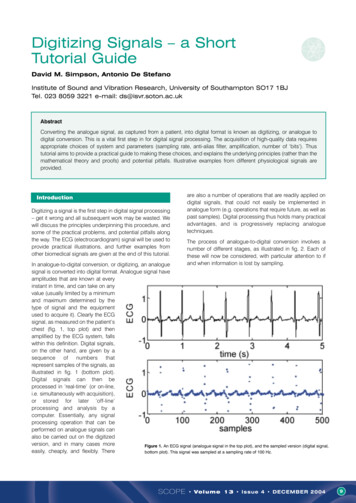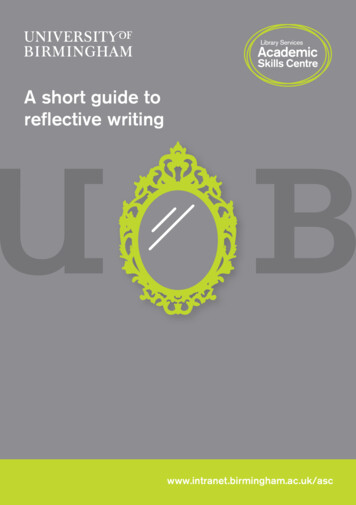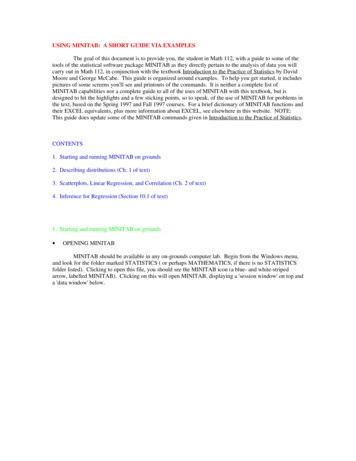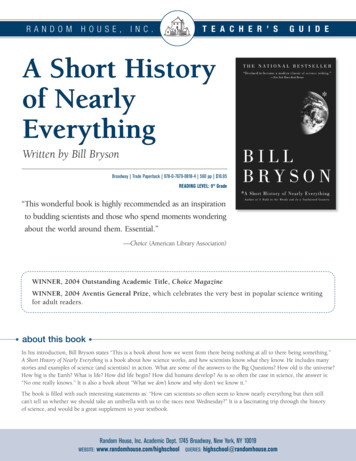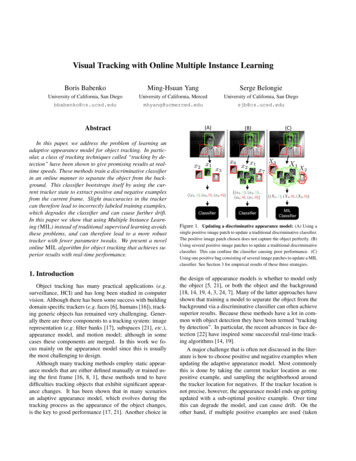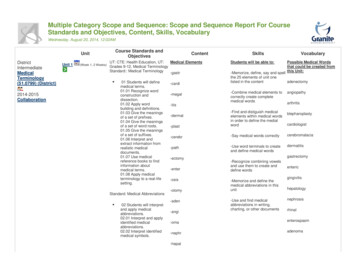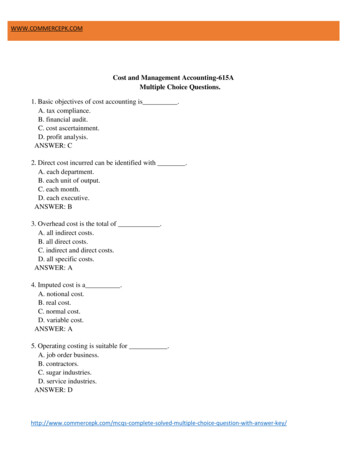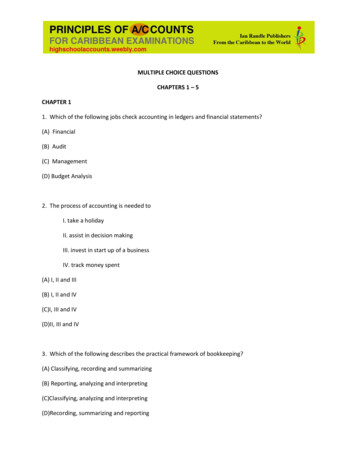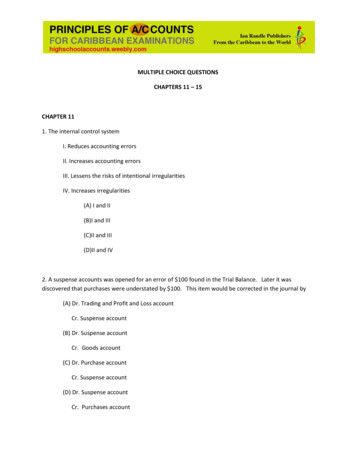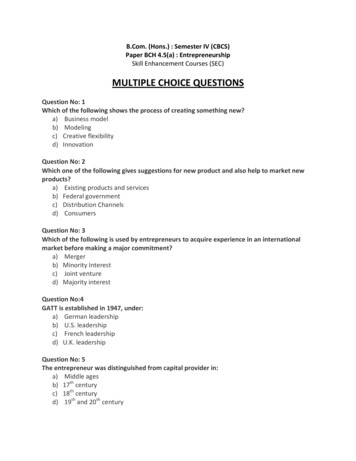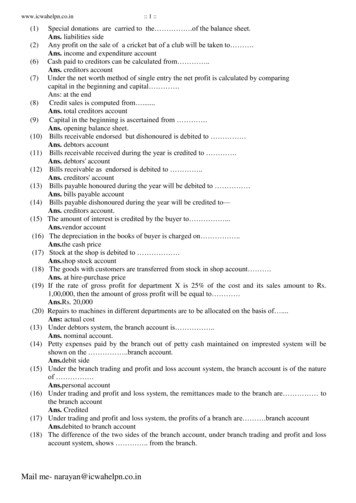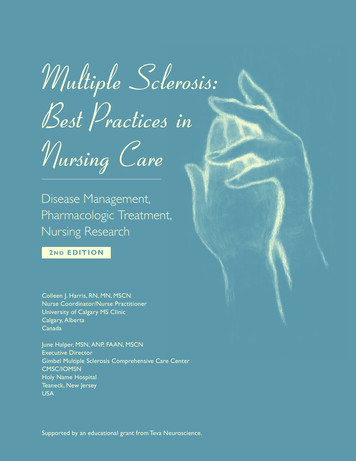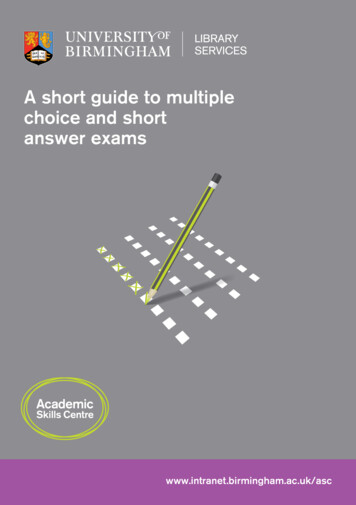
Transcription
A short guide to multiple choice and short answer examsA short guide to multiplechoice and shortanswer examswww.intranet.birmingham.ac.uk/asc1
2A short guide to multiple choice and short answer examsHow are multiple choice (MCQ) and short answer(SAQ) exams different to essay-based exams?LL OF FACTS,THEY TEND TO REQUIRE RECAIDEAS.RATHER THAN DISCUSSION OFTHEY OFTEN REQUIRE DESCRIPTIVE,FACTUAL RESPONSES RATHER THANANALYTICAL OR CREATIVE ONES.A FOCUSWITH MCQS, THERE IS OFTENERON CORRECT ANSWERS, RATHS.THAN CRITICAL THINKING SKILLWITH SAQS, BEING CONCISE IS KEY,AND THERE IS OFTEN A SPECIFIC NUMBEROF IDEAS OR FACTS THAT YOU NEEDTO MENTION IN ORDER TO GET FULLMARKS IN A QUESTION.
A short guide to multiple choice and short answer examsRevising forMCQs and SAQsFor MCQ and SAQ exams, you will need to know allof your course material well. Revising for these typesof exams will probably involve learning large amountsof facts. Start as early as possible so that you can keeprevisiting the information you need to learn.Revision strategiesWhen organising your notes Pay particular attention tofundamental terms and conceptsthat describe important events orfeatures, or that tie related ideastogether. Make lists and tables. Concentrateon understanding multi-stepprocesses, and on things that formnatural sequences or groupings.Look for similarities and differencesthat might be used to distinguishcorrect choices from distractersin an exam. Highlight vocabulary and keydefinitions, and be sure that youunderstand them. Re-organise your material intoquestions. Record facts in theform of questions and answers.When revisingDo not simply memorisedefinitions. Be sure that youknow what the definitions mean. Write questions on index cards,with answers on the back, or onyour phone or tablet. Carry themwith you everywhere so that youcan test yourself in spare moments. Set yourself challenges tocondense key information intothree sentences, or to fit it allonto one index card etc. Brainstorm possible questionswith your friends. Practise on sample questions,if you have access to a studyguide or old exams. If not, trymaking up your own. 3
4A short guide to multiple choice and short answer examsThe examSitting multiple choice examsThere are many strategies for maximising your successon multiple choice exams. The best way to improve yourchances, of course, is to study carefully before the exam.However, even a well-prepared student can make sillymistakes, or can fall prey to options that are designedto look very similar to the correct answer. Here are afew tips to help reduce these perils. Read the instructions for eachquestion carefully. For example,you might be asked to ‘Mark onecorrect answer’, or you might beasked to ‘Mark all correct answers.’Cover up the possible responseswith a piece of paper or your handwhile you read the stem/body ofthe question. Try to anticipate thecorrect response before you aredistracted by seeing the options.Then, uncover the responses.If you see the response that youanticipated, circle it and then checkto be sure that none of the otherresponses are better.If you find yourself taking a longtime over one question, skip itand come back later. If you return to a question you haveskipped and are still struggling, trya process of elimination. Eliminateany alternatives which are:– obviously wrong– completely unfamiliar to youfrom the course– the same ie, two answers thatmean the same thing– grammatically/ semanticallyinconsistent (ie, don’t make sense).Be sure that you have filled out theanswer sheet according to theinstructions given.Take time to check your work beforeyou hand in the answer sheet. Amultiple choice exam offers you noopportunity for ‘partial credit.’ If youticked, circled or filled in the wrongoption, your answer is 100% wrong,and you may be penalised.
A short guide to multiple choice and short answer examsNegative marking in MCQ examsIt is very important that you knowwhether or not you will be penalisedfor getting answers wrong in yourmultiple choice exam. In some stylesof exams, you lose marks for incorrectanswers. This is called negativemarking and its purpose is to preventstudents from being able to passthrough lucky guesswork.If your exam penalises wrong answers,only answer questions if you arereasonably confident that you havefigured out the correct answer. Ifnegative marking is not used in yourexams, answer all questions, even ifyou have to guess.TOP TIP!See our Short Guide to MemoryTechniques for advice onrecalling facts.True or False Questions Read the statementvery carefully. If EVERY part of the statementis true, the answer is true. If only ONE part is false,the answer is false. Look out for negativeseg, ‘It is not the case that.’ Take care with comparativestatements eg, ‘X is morelikely when Y than when Z.’ Look out for words like‘always’ and ‘never.’(This information has been adapted from: Universityof Bradford (2010), ‘Dealing with Multiple ChoiceQuestions’. Available from: amSuccess/Infosheet-Answering-MCQs.pdf)5
6A short guide to multiple choice and short answer examsSitting short answer examsShort answer questions could requireresponses of up to a page. There isusually a specific number of points toinclude in order to get full credit. It isimportant to identify exactly what thequestion is asking you to do and tobe as succinct and precise with youranswers as possible. State your points clearly, so that eachpoint stands out from the others. Ifnecessary, start a new sentence foreach. Avoid combining several pointsinto a complex answer. Do not pad out your answers withwaffle to make it look like you knowmore about the topic. Be concise and don’t feel thatyou have to include unnecessaryinformation just to make a shortanswer longer. They are calledshort answers for a reason!ConclusionThe key to these kinds of examsis preparation. Give yourself plentyof time to learn, revise and practise.Keep calm in the exam, readcarefully, and try to do justiceto all that preparation.Make sure you know whetheryou will be penalised for wronganswers, and remembered thatindividual questions may havetheir own specific instructions.For some memory tricks to helpyou to learn facts, check out ourShort Guide to MemoryTechniques for Revision.
A short guide to multiple choice and short answer examsFurther reading and referencesOnline resources on revision and examtechnique:Open University. Revision andexaminations. Available nations.php(Accessed 22nd June 2017)Oxford Brookes University. (2012) You andexams, Upgrade study advice service.Available at: ams.html (Accessed22nd June 2017)Skills4study Campus. (2012) Examinations.Available at: www.palgrave.com/Institutions/Birmingham.html (Accessed 22nd June2017)University of Bradford. (2010) LearnerDevelopment Unit, Dealing with MultipleChoice Questions. Available /ExamSuccess/Infosheet-Answering-MCQs.pdf (Accessed 22nd June 2017)Articles on revision and memorytechniques by Ed Cook, forThe Telegraph:Cooke, E. (2013) ‘Revision: how to breakdown complex concepts,’ The Telegraph,23 Feb. Available epts.html (Accessed 22nd June 2017)Cooke, E. (2013) ‘Revision techniques:How to learn boring facts.’ The Telegraph,26 Jan. Available at: tml (Accessed 22nd June 2017)Cooke, E. (2013) ‘The real test of learning?Not forgetting.’ The Telegraph, 9 Feb.Available at: Accessed 22nd June 2017)Cooke, E. (2013) ‘Why do spider diagramswork?’ The Telegraph, 5 Feb. Available ccessed 22nd June 2017)Academic Skills Centre. June 2017.7
Library ServicesEdgbaston, Birmingham,B15 2TT, United Kingdom15570 University of Birmingham 2017. Printed on a recycled grade paper containing 100% post-consumer waste.www.birmingham.ac.ukDesigned and printed by
A short guide to multiple choice and short answer exams 5 Negative marking in MCQ exams It is very important that you know whether or not you will be penalised for getting answers wrong in your multiple choice exam. In some styles of exams, you lose marks for incorrect answers. This
